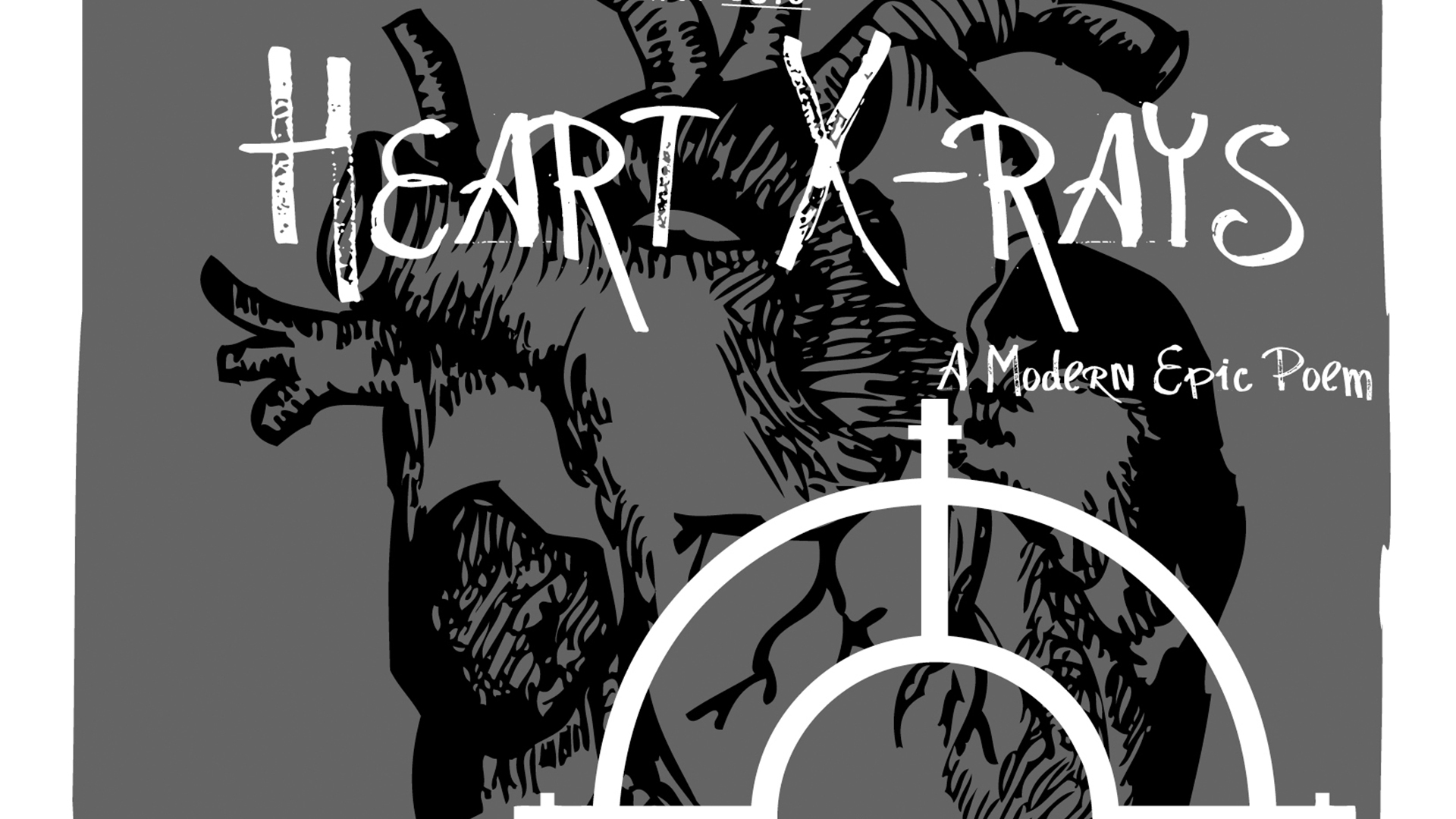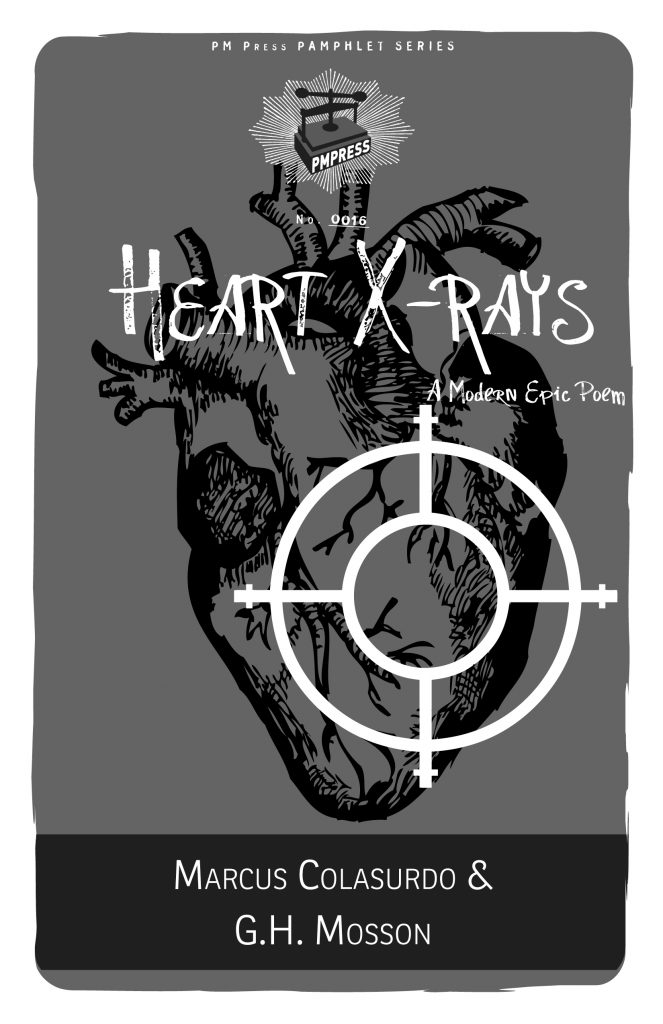By Dan Cuddy
The Loch Raven Review
November 2018
Heart X-Rays is
a very uneven book of poetry. Some of it is inspired and will amaze
readers. Other sections are run-for-cover rhetoric, rhyme
machine-gunning any ear within range as hip hop and Spoken Word poetry
often are. The back cover blurb describes the book as a twenty-first
century beat epic poem that ranges across landscapes and voices, with
appearances by Banksy, Pussy Riot, hip hop, the down and out, the up and
coming, heartbreak and joybreak, while exploring the mystery we call
the human heart. Is the book on meth? Despite stretches of rhetoric the
book has poems and passages that will excite the sober and sensitive
reader. The poem Charleston on page 7 is a very serious and moving poem
on the horrible murders of 9 churchgoers at the Emanuel African
Methodist Episcopal Church in July 2015. The poem starts with these
lines:
Tonight, I don’t know which God
You’re praying to.
I can’t tell which flag you salute.
I am not certain
If you believe in ghosts—
But tonight, I hear them singing:
Oh come, Oh come, Emmanuel
And I wonder just what
The cemetery shovels are burying
Tonight. Suppertime has long passed.
That poem is by no means the only treasure in this book. The immediate predecessor is a poem titled Street Scene. It starts
while you
are walking,
your head cradled
in your phone,
your ears plugged
with plastic,
there is no way
to alert you;
while you are walking, cooing
to pictures of yourself,
there is no way
to warn you……………..
The poem ends with these power-packed lines—–
but
beside you,
matching your strid
e
with familiar eyes,
the rapist
is
wearing
those
cool
shoes
It
is amazing how that one word “cool” carries so much ironic and symbolic
weight. In this context the word explodes with contradiction. The best
poetry can condense so much meaning and emotion in a minimum of words.
Are victims seduced by inattention, by the aura of a much admired man or
movement or promise?
The book is a collaboration between Marcus
Colasurdo and G(regg). H. Mosson. I don’t know what each poet wrote.
Perhaps they worked together on every individual poem. There is a
vernacular consistency throughout. The only whiff of academia is in the
second stanza of Game On. However, the use of such words as ”Inshallah”,
“Shalom”, “Sherpa” is not to show off erudition but to bridge cultures.
Basic humanity is the same; only the accidents of expression, language
differ. Whoever wrote the passage containing those words did it to
emphasize the common core.
Banksy? Pussy Riot? They are somewhat
maverick artists, outside the official approved culture by the
oligarchies. They go or have gone incognito throughout the streets of
the world. The authorities don’t like wry comments on public buildings,
or guitar slashes with revolutionary rhetoric, and especially not by
women. This book of poetry is certainly kin to those artists. It has a
bit of Whitman in its best rhetoric. However, the “Heart” being x-rayed
is not of any particular individual but of the collective fragmented
consumerist society. Are individuals and groups of individuals being
attacked by the manipulators of such a society? Have values been
co-opted, morphed into monstrosities? Are we as a whole victim to our
technology? In Leaving the Gift Shop the third stanza begins:
Techno-Human Poly-Trans-One
Facebooking the mothering void into insta-image
Joe’s heart shows up on the assembly line looking for a date:
Do you like poodles or bulldogs, noise rock or classical music?
Gotta go and accessorize the heart.
I can shake your hand or run you over it’s such a crowd.
Sold the land to TACO ABC
Got a bunk bed at 123 Furniture
Perhaps
the language here is unlike traditional poetry. Even Hart Crane’s
section “The River” of the epic The Bridge, the rhythm of it, is dated
by the strange and all pervasive technology which has claimed the 21st
century as its fiefdom. There isn’t majesty in the poem’s words above
but there is truth, an abstract mind-numbing mercenary truth. Whimsy is
the whore of invention these days. This book captures some of it.
However, recapturing the human is a necessity. The book does that too,
and that has echoes of the majesty from the past. Here is the closing
stanza of Game On, the last poem in the book:
What is the difference between you and I?
Ocean, I am here, let’s open.
Shut the heart down.
Why is my longing a rainbow
And where does it go?
Coax the heart down.
Sea, bathe me in the lull of thinnest tide.
If I can’t cure this rooted pain,
Can I disperse it into delicate rain?
Shelter the heart now.
Sand, with your billion hands, uphold this body.
If the love I feel turns my words to thunder,
Let the heart peek out.
Waves, cradle me in your rhythm.
There
is a lot to delight the average reader in this book. As with individual
people in life, you have to look past the annoying quirks that may not
be to your taste and you will find amazing genuine inventive poetry.
© Marcus Colasurdo, G.H.Mosson, and Dan Cuddy
Marcus
Colasurdo is the author of 11 books including the underground classic
novel Angel City Taxi. Over the years, he has worked as a bartender,
boom microphone operator, waiter, taxicab driver, factory worker, Job
Corps counselor, farmworker, journalist, construction laborer, teacher,
and more. He is the founder of Gimme Shelter Productions, a nonprofit
organization of artists whose performances benefit homeless shelters,
feeding programs, and other worthy causes.
G.H. Mosson is the
author of two books of poetry, Questions Of Fire (2009) and Season of
Flowers and Dust (2007). His poetry has appeared in The Cincinnati
Review, Measure, Smartish Pace, and The Tampa Review. He published the
journal Poems Against War: A Journal of Poetry and Action. He is a
writer, lawyer, father, and dreamer. He practices employee rights and
disability rights law as well as civil litigation. With Mr. Colasurdo,
he has performed as part of Gimme Shelter Productions.
Dan
Cuddy is currently an editor of the Loch Raven Review. He has been
published in many small magazines , e.g, Antioch Review, Free State
Review, Iguana Review, The Potomac, Connections, L’Allure des Mots,
Broadkill Review, End of 83. His book Handprint On TheWindow was
published by Three Conditions Press.
Back to G.H. Mosson’s Author Page | Back to Marcus Colasurdo’s Author Page







